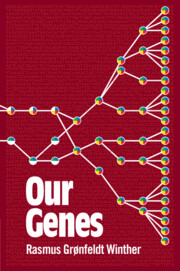Book contents
- Our Genes
- Frontispiece
- Our Genes
- Copyright page
- Dedication
- Contents
- Preface
- 1 Introduction
- 2 Origins and Histories
- 3 The Mind, the Lab, and the Field: Three Kinds of Populations
- 4 Metrics and Measures
- 5 Models and Methodologies
- 6 Six Patterns of Human Genomic Variation
- 7 Natural Selection
- 8 Intelligence, Female Orgasm, and Future Discovery
- 9 Is Race Real?
- 10 The Conscious Universe: Genes in Complex Systems
- References
- Index
- Plate Section (PDF Only)
7 - Natural Selection
Published online by Cambridge University Press: 14 December 2022
- Our Genes
- Frontispiece
- Our Genes
- Copyright page
- Dedication
- Contents
- Preface
- 1 Introduction
- 2 Origins and Histories
- 3 The Mind, the Lab, and the Field: Three Kinds of Populations
- 4 Metrics and Measures
- 5 Models and Methodologies
- 6 Six Patterns of Human Genomic Variation
- 7 Natural Selection
- 8 Intelligence, Female Orgasm, and Future Discovery
- 9 Is Race Real?
- 10 The Conscious Universe: Genes in Complex Systems
- References
- Index
- Plate Section (PDF Only)
Summary
The six empirical patterns painted in Chapter 6 capture basic features of global human genomic variation. In truth, there are seven such patterns. However, the seventh pattern – natural selection – is so complex and interesting that it merits a longer investigation. In human evolutionary genomics, findings about natural selection emerge, as in the preceding six empirical patterns, primarily from analyses of contemporary, global, and populational genomic variation, even if the genomic investigation of remnants of ancient Homo sapiens and of archaic hominins is also increasingly relevant. Although all patterns provide evidence that our species is much closer to Planet Unity than to Galápagos-Writ-Large (see Figure 4.1), relative to the other six patterns, the signatures of natural selection provide far more, and perhaps clearer, evidence for some Galápagos-Writ-Large in our genomes. This is one reason why natural selection has served as the speculative vehicle for some interlocutors to rashly posit that unique selection regimes in local environments are responsible for racial differentiation, not to say racial adaptation.
- Type
- Chapter
- Information
- Our GenesA Philosophical Perspective on Human Evolutionary Genomics, pp. 190 - 225Publisher: Cambridge University PressPrint publication year: 2022

